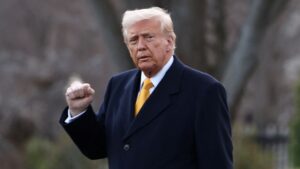The U.S. Economy Under Trump’s Leadership: Navigating Uncertainty and Resilience
As the winds of economic change sweep through the United States once more, the specter of a recession looms large, fueled by President Donald Trump’s controversial policies and the global market’s unpredictable nature. However, experts argue that despite these turbulent times, a downturn is not an immediate concern.
Current Economic Landscape
Recent discussions among economists reveal a complex picture of the U.S. economy. Holger Schmieding, chief economist at Berenberg Bank, stated during a recent CNBC interview, “I don’t think we will talk about a U.S. recession. The U.S. economy is resilient, I would say, largely despite Donald Trump.” His perspective sheds light on the ongoing economic resilience, largely driven by strong consumer spending and a robust labor market.
Though Trump’s approach to trade—characterized by abrupt tariff changes and ambiguous international diplomacy—has garnered criticism and caused market fluctuations, the current economic indicators suggest consumers have both the willingness and means to spend.
Evolving Consumer Confidence and Market Reaction
Yet, the atmosphere of uncertainty continues to influence consumer confidence. The Federal Reserve Bank of Atlanta’s GDPNow tracker indicates that U.S. GDP could contract by 2.4% from January through March 2025. This data suggests that while the economic growth trajectory might be unstable, it’s not yet indicative of a full-blown recession.
Business leaders and economists express concerns over the long-term effects of tariffs, warning that they could increase inflation and diminish consumer purchasing power. An increase in costs due to tariffs could compel consumers to tighten their budgets, prompting a slowdown in spending.
Additionally, the Federal Reserve remains cautious. Chairman Jerome Powell has indicated that the central bank is prepared to wait and observe how these aggressive policy decisions unfold before making any changes to the interest rate, currently set between 4.25%-4.5%. The Fed’s stance is significant; it implies that while they are aware of the economic headwinds, they do not see an immediate need for drastic intervention.
Transitioning to New Economic Policies
As Trump himself acknowledged, the U.S. economy is currently in a "period of transition." While he believes the changes will ultimately rejuvenate American wealth, many analysts are wary. Institutions such as JPMorgan and TS Lombard have signaled potential volatility ahead, largely driven by the unpredictable nature of Trump’s tariff policies.
Investment sentiment is cautious, and market experts advocate for vigilance, advising investors to monitor labor statistics closely. Any significant rise in the unemployment rate could signal troubling times, warranting a reassessment of economic strategies.
Navigating Market Volatility
For investors and stakeholders in the Extreme Investor Network community, the key takeaway is the importance of staying informed and agile. Market fluctuations and policy uncertainties can create not only challenges but also opportunities for those who can navigate this complex landscape effectively.
Here’s what you can do to adapt:
-
Diversify Your Portfolio: A robust investment strategy includes diversifying among various asset classes to mitigate risk during turbulent times.
-
Stay Updated on Economic Indicators: Monitor key indicators such as GDP data, unemployment rates, and consumer confidence to make informed investment decisions.
-
Engage with Financial Experts: Participate in discussions with economic analysts and engage with platforms that provide insights into market trends, such as the Extreme Investor Network.
- Be Prepared for Volatility: Understanding that market conditions can change rapidly will allow you to react swiftly and decisively, potentially capitalizing on short-term opportunities.
Conclusion
While concerns about a recession simmer in the backdrop of an ever-evolving economic narrative, the current data suggests that the U.S. economy’s resilience should not be underestimated. Navigating the economic landscape may require strategic planning and a willingness to adapt to new realities. The Extreme Investor Network is here to provide you with the tools and insights necessary to thrive in an uncertain economic environment. Rely on us to keep you informed and prepared as we move forward into this uncharted territory.

